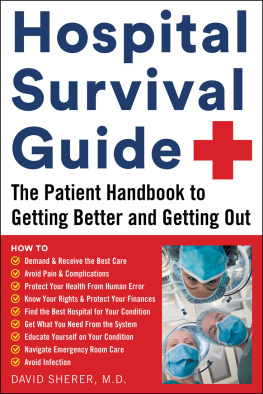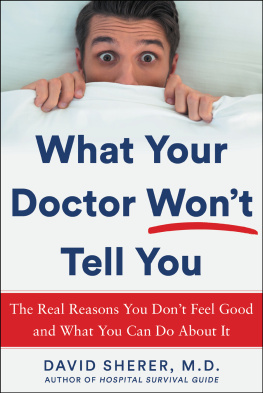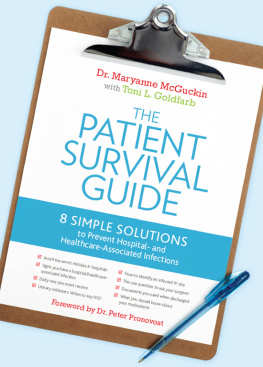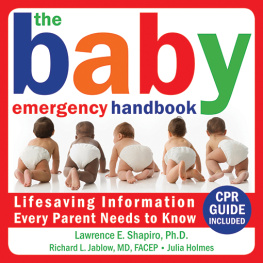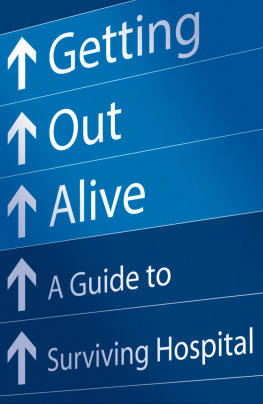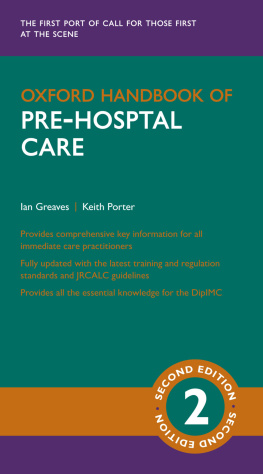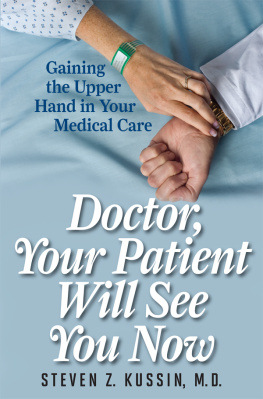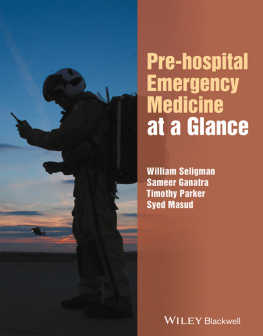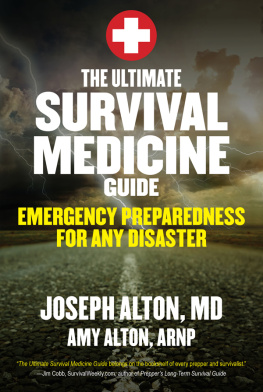
Hospital
Survival
Guide
Hospital
Survival
Guide
The Patient Handbook to
Getting Better and Getting Out
DAVID SHERER, M.D.

HOSPITAL SURVIVAL GUIDE
Copyright 2020 by David Sherer
All rights reserved
Humanix Books, P.O. Box 20989, West Palm Beach, FL 33416, USA
www.humanixbooks.com | info@humanixbooks.com
No part of this book may be reproduced or transmitted in any form or by any means, electronic or mechanical, including photocopying, recording, or by any other information storage and retrieval system, without written permission from the publisher.
Humanix Books is a division of Humanix Publishing, LLC. Its trademark, consisting of the words Humanix Books, is registered in the Patent and Trademark Office and in other countries.
Disclaimer: The information presented in this book is not specific medical advice for any individual and should not substitute medical advice from a health professional. If you have (or think you may have) a medical problem, speak to your doctor or a health professional immediately about your risk and possible treatments. Do not engage in any care or treatment without consulting a medical professional.
ISBN: 978-163006-163-0 (Paperback)
ISBN: 978-163006-164-7 (E-book)
Printed in the United States of America
10987654321
To all my medical teachers; past, present, and future.
Contents
Foreword
How This Book Can Help Make Your Hospital Stay Safe and Comfortable
T his second updated edition of my Hospital Survival Guide is presented with the benefit of examining and analyzing almost two decades of changes in hospital care, changes that in many ways reflect the evolution of healthcare in that same time period. Innumerable improvements in technology, particularly with regard to artificial intelligence and advances in robotic surgery, represent one large area of change. Another is the attention paid to pharmacy spending within hospitals, where up to 20% of a hospitals operating budget goes. Still another is the staffing challenges, where a critical shortage of nurses and the coming doctor deficit in our country will have a huge impact on an aging and increasingly chronically ill population. Also, the way doctors and hospitals get paid is an area of continuing evolution: The old fee-for-service model is being replaced, in many instances, by bundling and other payment systems that rely on meeting certain predetermined performance metrics.
Some of these changes will directly affect you and the experience you have in the hospital. Others will be less impactful. I will present them nonetheless to give you a better understanding of the developing trends in healthcare, and particularly in hospital care, and the direction in which they are heading.
But none of that has changed the real intention behind this book: to help you the patient endure what is often a stressful and unpleasant experience. After all, no one Ive ever met truly wants to have anything to do with hospitals.
To determine what information to put in this book, I looked back at a lifetime spent dealing with medical issues and nearly 40 years of my own interaction with patients. By lifetime, I mean the years before medical school, when I learned about illness, hospitals, and sickness-induced human suffering from my father, a doctor, and my mother, a former operating room nurse. When I was about 7 years old, I would go on rounds with my dad, who practiced medicine up until the last year of his life at age 87. For 57 years, my dad was a physiciandiagnosing, healing, and at times even suffering with his patients. Through these experiences, I witnessed how scared and uncomfortable people could be because they were ill and in the hospital. All of that made a strong impression upon me. But it was another important person in my young life who fueled my desire to help patients feel safer and more comfortablemy late sister. Her frequent complications from severe diabetes made her a revolving-door hospital patient for much of her all-too-brief life.
In short, the driving impetus behind this book emanates from a broad range of personal relationships and personal experiences, forces within me that exist even after I retired from clinical medicine in 2019. There was no triggering incident, no particular horror story behind it. My family background and the daily experience I had as a doctor seeing patients who were scared and uncomfortable were sufficient motivation for me to write this book to make the whole patient experience better. Patients, perhaps even more than when this book first appeared in 2003, still desperately want to regain some control over their lives.
As an anesthesiologist, I commonly saw patients at the height of their confusion and vulnerability. My presence reminded them that surgery was imminent, and that realization lead them to ask as many questions as they could before being hurried off to surgery. The hospital gown that leaves private parts exposed, and that hideous shower cap to cover your hair are only the external trappings of the control you relinquish. All of a sudden you realize: This is for realIm going to be unconscious in a room full of strangers, gadgets, and very sharp implements. Just then, you crave the details of your impending experience and wish you knew if anything could be done to make it better.
Every day before I administered anesthesia, I heard a stream of What ifs? and Then whats? That got me thinking that most of the questions I got at this point in the process ought to have been answered far earlier. The answers and reassurances people were seeking should have come from the patients own primary care physician, surgeon, specialist, the nursing staff, or even, in some cases, the health insurance plan or company. Because I may not have had the time to give the needed answers, the patient ended up going into surgery feeling more anxious than ever.
That shouldnt happen. I firmly believe patients have a right to know, if they wish, salient details concerning what was to be done to their bodies and what the recovery period was going to be like while in the hospital. This includes the long-term prospects for recovery as well. In this book, youll find out how to get that information from the right source and at the right timeas well as what to do if you receive unsatisfactory or unintelligible answers.
From the start to finish of your hospitalization, you have a right to expect that medical professionals will respect you and respond to your needs in a professional manner. Theres a flip side to your expectations, though. The hospital staff has a right to expect you to be open and honest about your condition and to be reasonable about the things you want done for your comfort. Theyll need you to be calm and cooperative, at least to the extent that you can manage it, while youre being poked and interrogated. They should understand that waking you up at four oclock in the morning to check vital signs or draw blood will likely, and justifiably, make you frustrated and angry with the system. Hopefully, youll realize that theyre not just waking you up out of a sadistic desire to deprive you of sleep, but because there is some clear medical purpose for doing so that cant be postponed. (If, however, they are waking you for a reason that could well be postponed, this book will tell you how to get them to not do it!)
To assist in making your hospital stay safe and comfortable, I will address the most frequently asked patient questions, plus many others you may not have thought of. I will alert you to potentially deadly medical errors and point out some of the small but annoying things about hospital care that you can learn to avoid, once youve been warned about them. I will also tell you stories of real people and their experiences (although I have changed the names and other identifying information for those individuals who requested anonymity). All in all, this book will be your insiders guide to make the hospital system work for you, so that you can endure the safest and most comfortable hospital stay possible.
Next page
